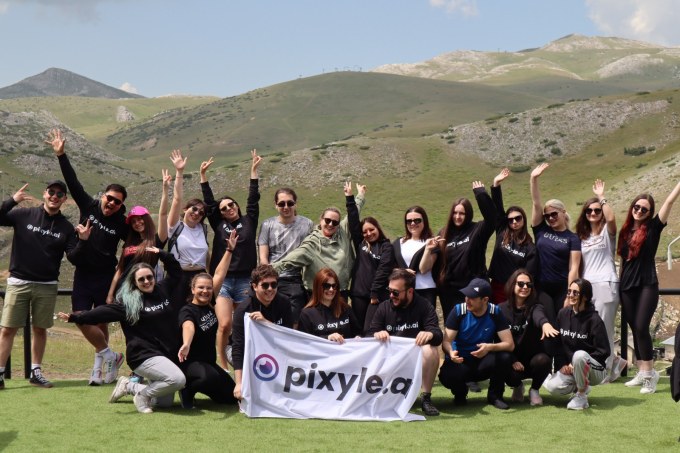When Svetlana Kordumova was studying for her doctorate in AI and computer vision, she grew frustrated by the process of looking for items to buy online. Search results were often inaccurate, and she knew the tech she was learning could improve the experience. Pixyle AI was launched in 2019 to improve product discovery on e-commerce sites and today announced a €1 million seed round (about $1.05 million USD) from South Central Ventures.
The startup, which has offices in Amsterdam and North Macedonia, now works with more than 20 clients, including Depop, Otrium and Minto. Over the past three years, it has tagged more than 250 million images and says it has increased conversions for its retail customers by 10% on average.
Pixyle AI’s neural networks train its visual AI algorithms to not only identify fashion items in an image, but also categorize them by attribute, like color or pattern, that match the keywords shoppers use when searching for an item. The goal is to “see” images as a human would. For example, someone searching for a “short summer dress with flower print in pink and purple” would get results with all those attributes.
Kordumova, who earned her PhD from the University of Amsterdam, first created a visual search app for consumers before pivoting to B2B in 2019. She told TechCrunch that one of the biggest challenges faced by online retailers is cart abandonment, often because of poor site search and product discovery. Research from Google Cloud shows that even though more people than ever are shopping online because of the pandemic, 52% abandon their cart and go to another site if there is only one item they can’t find.

The reason for search results is usually bad data. Retailers often get incomplete and inaccurate product data from brands of people listing secondhand items for sale, which means items don’t show up in search results. Many retailers deal with that problem by manually entering better product data, but that process is labor-intensive, expensive and prone to human errors.
“Take the example of color attributes, what one person might assess as yellow, another person might find to be more orange,” said Kordumova. “In the case of secondhand marketplaces with millions of products being uploaded on the platform, it’s simply an impossible task to manually add attributes to the metadata.”
Pixyle AI automates the process of extracting detailed attributes from pictures, and now has a growing fashion taxonomy that already clocks in at more than 20,000 attributes, with the goal of covering all possible search queries about clothing.
The startup’s customers include online marketplaces, brick and mortar retailers and fashion tech startups like wardrobe cataloging app Whering, virtual fitting solution Virtusize and live shopping marketplace Galaxy. Pixyle AI has helped brands that moved from brick-and-mortar stores to “phygital,” or an omnichannel strategy that blends e-commerce with physical retail points, by automating product tagging. This increases the speed at which they are able to digitize their shopping experience.
Some examples of how Pixyle AI’s tech has been used include automating manual product entry and catalog standardization at Otrium. The end-of-season fashion marketplace had previously been manually tagging and processing product attributes, but was unable to keep up with their growing inventory. Kordumova says Otrium was able to improve its productivity by 65% after implementing Pixyle AI to automate color detection for its inbound logistics team.
For consumers, Pixyle AI offers a visual search tool that lets them upload an image of what they are looking for and get similar results. Kordumova says sustainable fashion marketplace Project Cece reported a 50% higher conversion rate to product outlinks after adding Pixyle AI’s visual search tool to its site.
Other companies that have developed visual AI-powered product discovery tools include Syte, Visenze, Vue.AI and Google, which recently launched a multi-search tool that lets people search using text and images at the same time. Kordumova says Pixyle AI differentiates by focusing on product data enrichment with detailed attributes, and giving its clients a high level of customization and tagging flexibility.
“In order to make product data enrichment really work for each specific situation of our clients, we first let our teams align on what we’re trying to achieve, and make sure to set the right configurations before our AI models get to work,” she says. “This means we map taxonomies, configure cloud architectures and deploy customer and technical support teams to the exact needs of our customers, ensuring a successful implementation and usage of our platform to help them achieve long-term business goals.”
Pixyle AI plans to use its new funding to enhance its product offering, expand in the United States and Europe and move into new verticals. It will add new suites for industry segments and new offerings like product description generation and label detection using OCR tech that recognizes brands, material composition and size. It will also add “shop the look” and “multi-modal” search to its visual discovery product. For verticals, Pixyle AI plans to move into homeware and furniture by the last quarter of 2023.
In a statement about the investment, South Central Ventures managing partner Jan Kobler said, “A pivotal part of engaging online shoppers is product search, being able to find what you want easily and quickly. However, search has been hugely underserved and remains an unmet need for retailers and shoppers until now. Pixyle AI is laser focused on this opportunity and is already moving the dial with more sales for retailers. They have built a robust tech stack, which has been tried and tested in the market and is ready to scale.”
Google’s new ‘multisearch’ feature lets you search using text and images at the same time































Comment